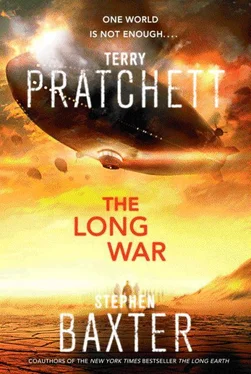Terry Pratchett - The Long War
Здесь есть возможность читать онлайн «Terry Pratchett - The Long War» весь текст электронной книги совершенно бесплатно (целиком полную версию без сокращений). В некоторых случаях можно слушать аудио, скачать через торрент в формате fb2 и присутствует краткое содержание. Год выпуска: 2013, ISBN: 2013, Издательство: Harper, Жанр: Фантастика и фэнтези, на английском языке. Описание произведения, (предисловие) а так же отзывы посетителей доступны на портале библиотеки ЛибКат.
- Название:The Long War
- Автор:
- Издательство:Harper
- Жанр:
- Год:2013
- ISBN:978-0-06-206777-7
- Рейтинг книги:4 / 5. Голосов: 1
-
Избранное:Добавить в избранное
- Отзывы:
-
Ваша оценка:
- 80
- 1
- 2
- 3
- 4
- 5
The Long War: краткое содержание, описание и аннотация
Предлагаем к чтению аннотацию, описание, краткое содержание или предисловие (зависит от того, что написал сам автор книги «The Long War»). Если вы не нашли необходимую информацию о книге — напишите в комментариях, мы постараемся отыскать её.
The Long War — читать онлайн бесплатно полную книгу (весь текст) целиком
Ниже представлен текст книги, разбитый по страницам. Система сохранения места последней прочитанной страницы, позволяет с удобством читать онлайн бесплатно книгу «The Long War», без необходимости каждый раз заново искать на чём Вы остановились. Поставьте закладку, и сможете в любой момент перейти на страницу, на которой закончили чтение.
Интервал:
Закладка:
“In the digests that were circulated about the beast that the Mark Twain travellers—well, you , I suppose—called First Person Singular, you suggested that the creature travels the Long Earth making a sort of audit. A stocktaking!”
“It’s as good a first guess as any. There seem to be various different subspecies, none as large or as threatening as the original First Person Singular, however. Not all of them have this kind of shell-like carapace for example. All of them are themselves colony organisms, like Portuguese men o’ war writ large—but they grow , they add to themselves by collecting specimens from the land and sea, some taking passengers as you see here, some incorporating them into the greater organism, like First Person Singular. And they are sapient, to some degree. Of course sapience implies purpose.”
“What purpose?”
Lobsang shrugged, a little artificially. “Perhaps they are indeed collectors. Latter-day Darwins, or their agents, scooping up interesting creatures for—well, for science? To populate some tremendous zoo? Simply for their aesthetic appeal? You’ll observe that most of the animals gathered here are of a similar body weight, within an order of magnitude or two—no blue whales, of course, and very few mice or rats. As if selectively sampled. But that may be too narrow a perspective. It seemed to me that the only goal of First Person Singular was to learn, to grow—goals shared with all minded creatures. But perhaps she was a special case…”
Whatever the purpose of all this, the human population considered it not a bad deal, as far as Nelson could tell. According to Lobsang, their living home looked after them even when it found it necessary to submerge: it took its animal and human passengers into air-filled chambers inside its carapace.
“Not that it submerges too often,” Lobsang said. “Bad for the vegetation on its back, not to mention the layer of topsoil it accumulates… It’s like an unending cruise, don’t you think?
“Hmm. The Titanic without the iceberg.”
“Lots of good company, plenty of seafood and occasionally other maritime fare including oysters and the occasional seal—but never dolphins, Nelson—oh, and plenty of sex.”
Nelson had guessed that, given the embarrassing attention he himself was getting from a number of young women. “And the people?”
“Nelson, there are billions in the suffering worlds of mankind who would think themselves blessed if they found themselves on this living shore.”
Nelson grunted.
Lobsang inspected him. “Ah, you don’t approve, do you? My dear Nelson, I see it in your eyes and in every expression. You, my friend, are a Puritan, privately aghast at the situation; you are thinking that mankind shouldn’t live like this—there is a lack of striving which you find distasteful, yes? This is at the root of your unease about the Long Earth itself, I suspect. It’s too easy. Mankind, you believe, should be always looking towards the stars, ever striving, learning, growing, bettering itself, challenging the infinite.”
Nelson stared at Lobsang’s face, which showed deadpan with just a hint, a tiny scintilla, of humour. What was the human and what was the computer? “You are disturbingly perceptive.”
“I’ll take that as a compliment.”
60
They stayed aboard Second Person Singular for some days.
It was a pleasurable enough interval, but Nelson did find it hard to relax into a lotus-eating lifestyle—maybe Lobsang was right that he had the soul of a Puritan—and the innocence of the beast’s human passengers brought out something of the teacher, or the shepherd, in him.
The islanders were short on raw materials; they had a few handfuls of flint shards, bits of obsidian, metals, evidently garnered from the pockets of shipwrecked ancestors. They treated these as toys, tokens, ornaments. So, with scraps from the twain, Nelson taught them a certain amount of Metalwork 101. How to draw wire, among other things, allowing them to augment their meagre stock of treasured fish-hooks. He even left them instructions in the basics of crystal-set radios. Maybe some day they could use that technology to reconnect with the rest of mankind, whatever fraction of it passed through this world.
The islanders smiled and nodded, applauded when he assembled some intricate component, and used his bits of wire to adorn their hair.
Nelson spent some time too strolling in what he called the jungle, the scrap of forest on the carapace. It flourished pretty well, despite periodic dunkings in the sea, but was an eclectic mix of species that reminded him more of a botanic garden collection than anything natural: from ferns to eucalyptus, and many species Nelson failed to recognize. As for the animals, Lobsang was right about there being a rough selection operating for size, in terms of body mass. The elephant types seemed to be a kind of mammoth, with curling tusks and ragged orange-brown fur. But they were dwarfed, no taller than a pony in St. John on the Water, and very shy.
Another question that occurred to Nelson was how old this beast was. How long had it been sailing these stepwise seas? If he dug around in the forest, or in the dark spaces within its carapace, would he find the bones of antique beasts—the skeleton of a stegosaur?
Even Lobsang had no answer to such questions.
It was in the jungle, on the fourth day, with Nelson deep in thought, that Cassie trapped him. She was the woman who habitually wore a red flower in her hair, who had asked for tobacco when he’d landed.
He knew by now what she wanted. He tried to avoid eye contact with her, but, with the susurration of the sea all around them, he was cornered in her stare.
“Mister Lobsang say you are tight and sad and needing loving…”
The statement hung there, and Nelson could practically hear two value systems colliding in his head with a scream of stripped cogs. All right, he was a Puritan type; any male child brought up by Nelson’s mother on the one hand and her version of God on the other would have turned out that way. He had had relationships, including a long-term girlfriend with whom he’d had an “understanding’, a very old-fashioned term, but…
But then there were the islanders. He’d seen evidence of long-term relationships, like marriages, but among the young especially things were pretty relaxed. After all, everybody here knew everybody else—it was just like St. John on the Water in that regard—and there was a kind of protective communal tolerance.
Besides, as Lobsang had told him, it was good for the islanders to have their gene pool replenished by passing travellers. Nelson almost had a duty to accept this invitation.
“Only a little wiggle, Mister Nelson!” She smiled, and laughed, and walked up to him.
And suddenly he was immersed in the moment, the analytical part of his mind seemed to dissolve and his forty-eight years fell away. The world was alive with light and colour, the blue and the green, he could smell the sea and the vegetation and the animals of this place, he could smell the seawater-salt on the flesh of this woman as she approached him, and when she touched his lips with a fingertip he could taste her…
Nobody saw them. Well, save for Lobsang, probably.
Afterwards he stayed away from the jungle, and was never alone with Cassie, ever again.
On the fifth day, for a shower and a change of clothes, they returned to the twain, which shadowed the wake of Second Person Singular.
They sat together in the gondola, in formal western clothing that now felt stiff and confining. The living island drifted beneath them, complex, beautiful, fecund. It might almost have been designed to be viewed from the air.
Читать дальшеИнтервал:
Закладка:
Похожие книги на «The Long War»
Представляем Вашему вниманию похожие книги на «The Long War» списком для выбора. Мы отобрали схожую по названию и смыслу литературу в надежде предоставить читателям больше вариантов отыскать новые, интересные, ещё непрочитанные произведения.
Обсуждение, отзывы о книге «The Long War» и просто собственные мнения читателей. Оставьте ваши комментарии, напишите, что Вы думаете о произведении, его смысле или главных героях. Укажите что конкретно понравилось, а что нет, и почему Вы так считаете.











